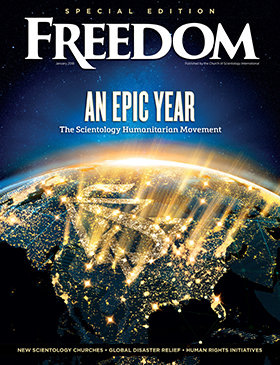
Learning bears fruit when it is applied. Wisdom, of course, can be pursued for its own sake: there is even a kind of beauty in it. But, truth told, one never really knows if he is wise or not until he sees the results of trying to apply it.
Any activity, skill or profession, ditch-digging, law, engineering, cooking or whatever, no matter how well studied, collides at last with the acid test: can one DO it? And that doing requires practice .
Movie stuntmen who don’t practice first get hurt. So do housewives.
Safety is not really a popular subject. Because it is usually accompanied by “be careful” and “go slow,” people can feel restraints are being put on them. But there is another approach: if one is really practiced, his skill and dexterity is such that he doesn’t have to “be careful” or “go slow.” Safe high speed of motion becomes possible only with practice.
One’s skill and dexterity must be brought up to match the speed of the age one lives in. And that is done with practice.
One can train one’s eyes, one’s body, one’s hands and feet until, with practice, they sort of “get to know.” One no longer has to “think” to set up the stove or park the car: one just DOES it. In any activity, quite a bit of what passes for “talent” is really just practice.
Without working out each movement one makes to do something and then doing it over and over until one can get it done without even thinking about it and get it done with speed and accuracy, one can set the stage for accidents.
Statistics tend to bear out that the least practiced have the most accidents.
The same principle applies to crafts and professions which mainly use the mind. The lawyer who has not drill-drill-drilled on courtroom procedure may not have learned to shift his mental gears fast enough to counter new turns of a case and loses it. An undrilled new stockbroker could lose a fortune in minutes. A green salesman who has not rehearsed selling can starve for lack of sales. The right answer is to practice, practice and practice!
Sometimes one finds that what one has learned he cannot apply. If so, the faults lay with improper study or with the teacher or text. It is one thing to read the directions; it is sometimes another thing entirely to try to apply them.
Now and then, when one is getting nowhere with practice, one has to throw the book away and start from scratch. The field of movie sound recording has been like that: if one followed what recordist texts there have been, one couldn’t get a bird song to sound any better than a foghorn—that is why you can’t tell what the actors are saying in some movies. The good sound recordist had to work it all out for himself in order to do his job. But in the same field of the cinema there is a complete reverse of this: several texts on cine lighting are excellent: if followed exactly, one gets a beautiful scene.
It is regrettable, particularly in a high-speed technical society, that not all activities are adequately covered with understandable texts. But that should not stop one. When good texts exist, value them and study them well. Where they don’t, assemble what data is available, study that and work the rest of it out.
But theory and data blossom only when applied and applied with practice.
One is at risk when those about one do not practice their skills until they can really DO them. There is a vast difference between “good enough” and professional skill and dexterity. The gap is bridged with practice.
Get people to look, study, work it out and then do it. And when they have it right, get them to practice, practice, practice until they can do it like a pro.
There is considerable joy in skill, dexterity and moving fast: it can only be done safely with practice. Trying to live in a high-speed world with low-speed people is not very safe.
The way to happiness is best traveled with competent companions.






















